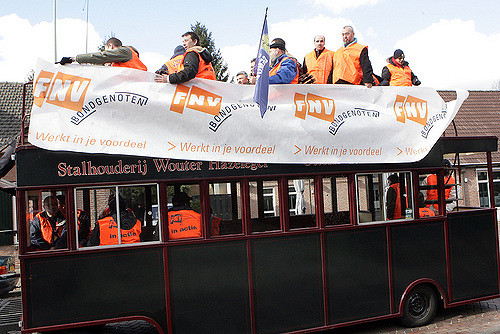Exploring the recent History of Labour Union Practices
- Projectleader: Matthias van Rossum
- Junior researcher: Moira van Dijk
- Student-assistants: Loran van Diepen, Rosa Kösters en Bob Scholte
The Historische Verkenningen Vakbeweging project conducts (preliminary) research into the recent history of the (Dutch) trade union movement. By looking specifically at recent history, we want to promote research into the (historical) development of the trade union movement in the Netherlands in general.
Why: Trade union movement in turbulent times
The trade union movement faces major challenges. Not only in the Netherlands, but almost everywhere in the world, trade unions were confronted with rapid and strong political and economic changes in the past forty years. Globalisation intensified the relocation of (industrial) production, while European integration fuelled internationalisation and competition in labour, capital and services. The welfare state came under pressure and was also subjected to a robust transformation in the Netherlands.
In large parts of the world, the trade union movement faced periods of unemployment, changing (production) technologies and more flexible labour relations. The internationalisation of the economy through rapid developments in communications and transport made the challenges, considerations and ways of working of trade union movements more international. At the same time, trade union membership numbers were declining in most parts of the world.
In the Netherlands, trade unions saw their membership numbers decline especially during the crisis of the 1980s. After the recovery in the 1990s, the last 15 years were characterised by a stable but very steady decline in membership at the FNV and CNV.
Globally, trade unions struggled with their position in the midst of all these developments. At various times, these challenges led to emphatic reflection on the role and strategy of the trade union movement. This led to internal discussion, but also to strong changes in working methods, direction and organisation.
In the case of the FNV, for example, issues around strategy were central around the 1987 report, the merger of FNV Bondgenoten in 1998, the board elections at Abvakabo FNV in 2010, and the merger of the FNV unions in 2014. This reorientation took place in a changing political landscape and sharp changes in citizens' worldview and understanding of trade unionism.
The ideological frameworks that were influential until the 1980s shifted to more individualistic approaches in the 1990s.
From the end of the 1990s, criticism of the neoliberalism of that decade grew strong, while at the same time problems were interpreted in new frameworks, often focusing on direct (socio-economic) problems experienced in the workplace or in everyday life. In trade union work during this period, therefore, old and new methods were balanced against each other, sometimes influenced by international examples, such as the method of organising introduced in the second half of the 2000s.
How: Historical analysis, social responses
This recent history of the Dutch trade union movement has barely been studied. Despite the potential of this period to provide more insight into the challenges trade unions faced and the responses they formulated, analysis of trade union strategy and development in this period is as yet very limited.
Existing (historical) studies have mainly focused on the organisational history of the CNV, NVV and FNV, commemorative or historical overviews of specific trade unions (such as the Industriebonden, Abvakabo, Voedingsbond, Vrouwenbond), and the role or memories of individuals involved in trade unionism.
Some more contemporary sociological studies have paid further attention to the changes of the welfare state and the role of the trade union movement, and the effects of globalisation and informalisation on the position of the trade union movement.
A thorough study of this recent history is of great importance to portray the effects of trade union practice and strategy from a Dutch and an international-comparative perspective. This is relevant for the actors involved in trade unions themselves, as it offers insights into the effectiveness of the practices used and thus also provides a breeding ground for future (re)reflections. In addition, a study of the trade union movement is also of social and scholarly interest, as it offers insights into the development of social cohesion and social organisation in a broader perspective. As one of the most important forms of social connection in society, the recent-historical development of the trade union movement in particular is a crucial case study for this purpose.
Who and What: Research project
The project ‘Historische Verkenningen Vakbeweging’ aims to conduct preliminary research into the recent history of the (Dutch) trade union movement.It is part of the cooperation between FNV and IISG to promote research on the (historical) development of the trade union movement in the Netherlands. The project is possible thanks to a grant from the FNV. The IISG carries out this research independently. The aim of the project is historical exploration of the development of the trade union movement's practice, constituency and position in recent decades (circa 1980-2015).This subproject leads to an overview of available sources, an outline of relevant (historical) developments and the formulation of initial explanatory models.
The results of this subproject provide the basis for further elaboration of a concrete research agenda for the historical analysis of the trade union movement's recent past. Based on the first subproject, research applications will be formulated for this purpose (the NWO application is envisaged; the possibility of European subsidies will be explored).
The central question of the project is how trade unions have formulated responses to new challenges around globalisation, precarisation and changing employment practices in recent decades.
The historical analysis of the trade union movement's search for (new) answers through changes in trade union practices is central to the content, and will be embedded in an analysis of the trade union movement's changing constituency and its changing socio-economic context and position.
Image 'Demonstration cleaners CSU':© CreativeCommons: Hans van der Poel / FNV Bondgenoten



